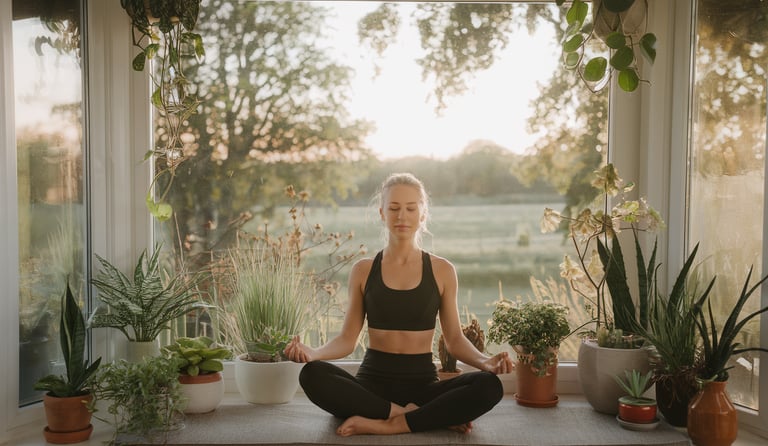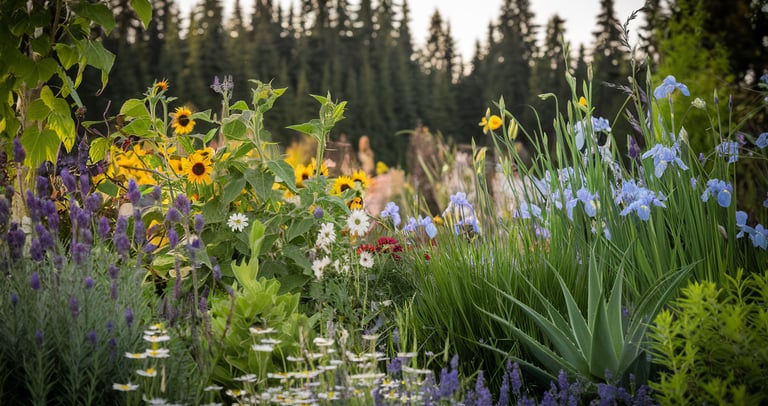Plant-Powered Self-Care: Discover How Nature Heals, Uplift and Transform You
Nature is the ultimate healer. When we align with the power of plants—whether through nourishing foods, herbal teas, essential oils, or grounding rituals—we invite deep healing, balance, and transformation into our lives.
SELF-CARE AND WELLNESS
FONNI
2/26/20255 min read


There’s something undeniably magical about being surrounded by plants. Whether I’m walking through a lush park or just sitting next to a small potted succulent on my desk, I feel an instant sense of calm. It’s like nature reaches out and gently reminds me to breathe, slow down, and appreciate the moment.
But here’s the thing—plants are more than just a backdrop to our lives. They are powerful allies in our self-care journey. For centuries, humans have relied on the natural world for healing, grounding, and nourishment. And today, as we navigate the hustle and chaos of modern life, embracing plant-powered self-care can be a game-changer.
So, let’s dive into how nature can heal and uplift us in ways we may not even realize. Together, we’ll explore the ancient bond between humans and plants, uncover the benefits of nature therapy, and learn how to create our very own plant sanctuaries. Trust me, by the end of this, you’ll be ready to bring a little more green into your life.
The Ancient Bond Between Humans and Plants
Have you ever noticed how good it feels to walk through a garden or sit under a tree? That feeling isn’t just in your head—it’s hardwired into us. Humans and plants have been connected for as long as we’ve existed. Ancient civilizations used plants not only for food and medicine but also for spiritual and emotional healing.
Think about herbal remedies that have stood the test of time—chamomile for calming, lavender for relaxation, and peppermint for energy. These ancient practices weren’t just about survival; they were about thriving. When we connect with plants, we’re tapping into centuries of wisdom and a deep, natural relationship.
Even today, science backs this up. Studies show that spending time with plants can reduce cortisol levels (the stress hormone), lower blood pressure, and improve mood. Simply being in nature or having plants around us is like hitting a mental reset button.
How Plants Boost Mental Health and Emotional Well-Being
Let me share a little secret: on stressful days, I make it a point to water my plants or take a quick walk through a nearby park. It’s such a simple act, but it never fails to lift my mood. And I’m not alone—science agrees that plants are powerful tools for mental well-being.
Dr. Charlie Hall, a researcher in horticultural therapy, has shown that plants can trigger the same feel-good responses in our brains as spending time with pets. Just being near greenery can help us feel calmer, happier, and more focused.
Here are a few ways plants work their magic:
Stress Reduction: Spending just 10 minutes with plants can lower stress levels and promote relaxation.
Mood Boosting: Interacting with plants—whether through gardening or simply tending to a potted herb—can trigger the release of serotonin, the “happy” hormone.
Improved Memory and Focus: Studies show that working in plant-filled environments can improve concentration and memory by up to 20%.
If you’re looking for an easy way to boost your mood, start by adding a few low-maintenance plants (think succulents or pothos) to your space. Every time you see them, you’ll be reminded of nature’s healing energy.
Bringing Nature Indoors: The Power of an Indoor Plant Sanctuary
In today’s world, we spend more time indoors than ever—about 85% of our day, in fact. That’s why it’s so important to bring nature inside with us. Creating an indoor plant sanctuary doesn’t just beautify our space—it also nurtures our mind, body, and spirit.
When I started adding more plants to my home, I noticed a huge shift in my energy. The air felt fresher, my stress melted away, and I felt more connected to myself. And it turns out there’s a reason for that! Indoor plants can:
Purify the Air: Plants like spider plants and peace lilies remove toxins from the air, leaving us with cleaner, more oxygen-rich spaces.
Reduce Anxiety: Studies have shown that just looking at greenery can lower anxiety levels.
Create Purpose: Caring for plants gives us a sense of accomplishment and responsibility—a beautiful reminder of our ability to nurture and grow.
Mindful Plant Care as a Form of Self-Love
Tending to plants can be a deeply mindful practice. When I care for my plants, I’m fully present—paying attention to the soil, the light, the leaves. It’s like I’m nurturing not just the plant but also my own well-being.
Mindful plant care can help us cultivate patience, gratitude, and awareness. As we water our plants, we can take a moment to reflect on our own needs. Are we giving ourselves enough rest? Enough sunlight? Enough love?
Try this the next time you care for your plants: as you water or prune, repeat a positive affirmation to yourself, like:
“I am growing and thriving, just like my plants.”
“I am worthy of care and love.”
“I am patient with my growth and progress.”
This simple ritual can become a powerful reminder of your worth and resilience.
The Science of Plant Therapy: How Nature Affects the Brain
Did you know that doctors in some countries now prescribe nature as a form of therapy? That’s because the benefits of plant therapy are backed by science. Research has shown that even small doses of nature—like having a few potted plants or taking a 15-minute nature walk—can have profound effects on mental and physical health.
Here’s what plant therapy does for our brains:
Lowers Cortisol: Being around plants reduces stress hormones, helping us feel calmer and more balanced.
Boosts Creativity: Nature exposure has been linked to enhanced creativity and problem-solving skills.
Improves Sleep: Having plants in your bedroom can create a more restful, peaceful environment.
Plant-Based Aromatherapy: Nature’s Healing Scents
One of my favorite ways to incorporate plant-powered self-care is through aromatherapy. Essential oils, derived from plants, can uplift our mood and promote relaxation. Here are a few go-to oils for self-care:
Lavender: Soothes anxiety and promotes deep sleep.
Peppermint: Energizes and clears the mind.
Eucalyptus: Opens the airways and promotes clarity.
Rose: Encourages self-love and emotional healing.
Incorporating these scents into your daily routine—whether through diffusers, bath soaks, or candles—can create a calming, nurturing environment.
Outdoor Nature Connection: Tapping into the Wild
While indoor plants are wonderful, nothing beats the healing power of being outdoors. Whether it’s a walk in the park, a hike in the woods, or simply sitting on your porch, connecting with nature can be profoundly grounding.
Studies show that spending just two hours a week in nature can significantly improve mental and physical health. Activities like forest bathing (a Japanese practice of mindful nature immersion) can lower blood pressure, reduce stress, and enhance creativity.
How to Create Your Own Plant Sanctuary
Ready to bring more plant-powered self-care into your life? Here are a few simple steps to create your own healing plant sanctuary:
Start Small: Begin with a few easy-care plants like snake plants, succulents, or pothos.
Engage Your Senses: Incorporate natural textures, water features, and aromatherapy to create a multi-sensory space.
Designate a Calm Space: Create a corner of your home dedicated to relaxation and nature connection.
Practice Gratitude: As you care for your plants, take a moment to express gratitude for their presence and the peace they bring.
Embracing the Green Path to Self-Love
Plant-powered self-care is more than just a wellness trend—it’s a path to deeper self-love and healing. By connecting with nature, we reconnect with ourselves. We learn to slow down, breathe, and appreciate our growth.
So, surround yourself with greenery. Let the healing power of plants remind you of your own resilience, beauty, and strength. And remember: just like nature, you are always growing, always thriving, and always worthy of love.




